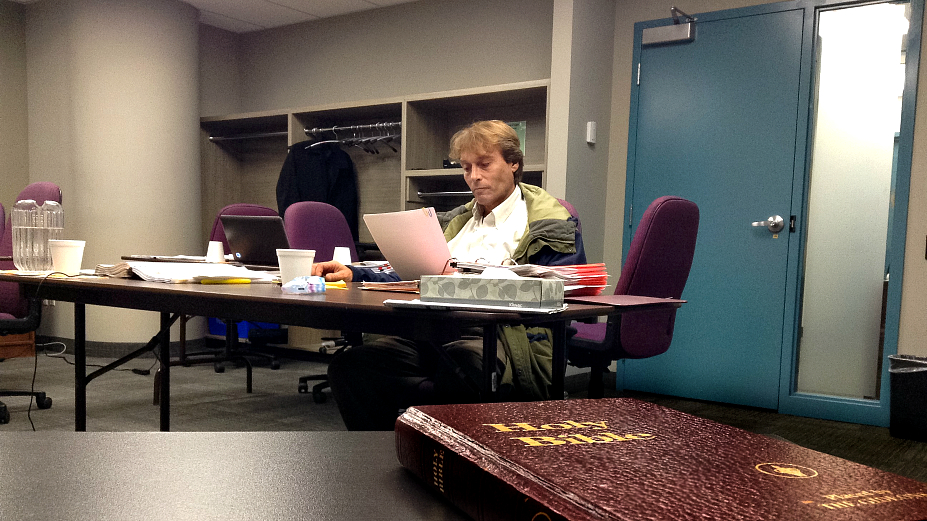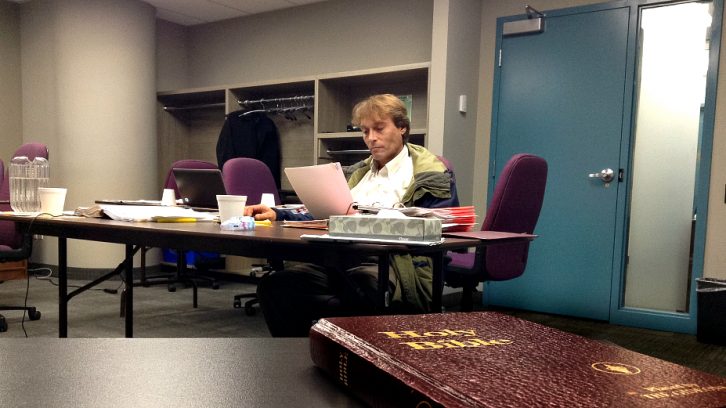Law
Man wins medical marijuana coverage
‘I was struggling to afford the minimum prescription to make it through the day’

caption
Gordon (Wayne) Skinner preparing himself for the hearing.
caption
Skinner preparing himself for the hearing in Oct. 2016.Gordon (Wayne) Skinner has won his fight for medicinal marijuana coverage in a provincial human rights hearing.
A human rights board of inquiry with the Nova Scotia Human Rights Commission, chaired by Benjamin Perryman, ruled on Jan. 30 that Skinner’s medical marijuana expenses are to be covered by his employee insurance plan.
“It’s certainly the most challenging fight I’ve had in my life,” an emotional Skinner of Chezzetcook, N.S. said in a phone interview on Wednesday. Related stories
“Part of the driving force was so other individuals don’t have to go through what I’ve gone through to have disabilities accommodated,” he said. “Nobody needs to be in chronic pain.”
Skinner was injured in a car accident while working in August 2010, as The Signal previously reported. He later discovered he wasn’t covered under his worker’s compensation with his employer, ThyssenKrupp Elevator Ltd.
Skinner told The Signal that medicinal marijuana is the only pain relief medication he can handle. The drug “eliminates opiates,” he says. He says that unlike prescription narcotics, cannabis “lets me think clearly.”
Skinner chose to dismiss the aid of appointed legal counsel, and he credits his success to the clear mind medicinal marijuana allowed him.
“On opiates, I never would have been capable of this,” Skinner said on his struggle representing himself during the human rights hearings.
Medicinal marijuana advocacy groups such as Canadians for Fair Access to Medical Marijuana (CFAMM) aim to eliminate hurdles for patients such as Skinner.
“Patients just want to be treated like anyone else,” said CFAMM founder and executive director Jonathan Zaid.
The affordability of medicinal marijuana is a concern for patients, and acquiring it can be “very difficult with limited income and without access to coverage like every other medication,” he said.
Zaid said that medical marijuana users face a lot of stigma, as some people perceive it to be a recreational drug without any medical benefits.
“There’s a potential for people to discriminate when patients are that stigmatized,” he said.
Zaid explained that many patients seeking insurance coverage for medicinal marijuana treatments must apply to their employer or insurance provider, “which is a long process and requires the employer to be supportive.”
While the precedent for future insurance policies remains to be seen, Zaid said that Skinner’s case “demonstrated that under certain circumstances, employers should cover (medicinal marijuana) and should treat it similarly to any other prescription medication that is covered.
The human rights board’s decision means that the Canadian Elevator Industry Welfare Trust Plan, the organization that covers Skinner’s benefits, must cover his medicinal marijuana costs as an eligible expense.
“Since medical marijuana requires a prescription by law, it did not fall within the plan’s exclusions,” said a Government of Nova Scotia press release about the hearing. “Since medical marijuana was prescribed for pain management, it was accepted that it is a medical necessity and should be covered.”
As far as Skinner is concerned, there might be more legal action to come.
“I don’t know if this is the end of the line; I’m not a lawyer,” Skinner said. However, he plans on continuing his case with the worker’s compensation board, where he’ll be “fighting for accountability, but not for my life.”
He added that he is still very overwhelmed, but is relieved in the confirmation that the human rights “charter is there for everybody.”
“I’ve got it in my heart now that the struggle to have medication, to survive, is over,” he said.
